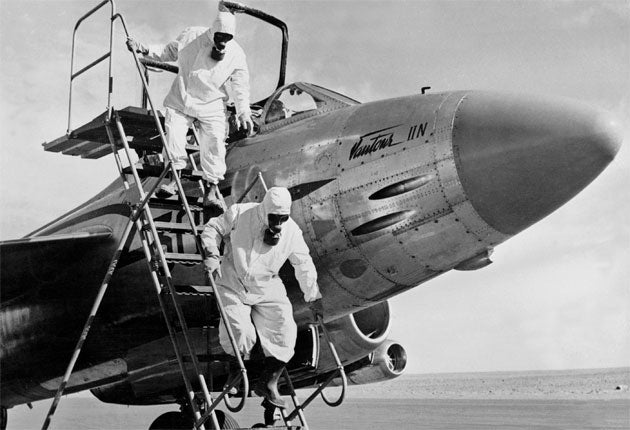France exposed troops to radiation
Leaked report says soldiers were told to advance into heart of mushroom cloud

France deliberately exposed 300 of its conscripts to an atomic bomb test in the Sahara in 1961 to discover whether soldiers could fight immediately after a nuclear explosion, it emerged yesterday.
An official report leaked to a French newspaper said that, within an hour of the test in southern Algeria, some conscripts were ordered to advance to within 275 metres of the point where the bomb exploded.
Although there has been controversy for years over the sicknesses suffered by French personnel who witnessed nuclear tests, this is the first time that evidence has emerged of a deliberate policy by the French to expose soldiers to radiation.
Lucien Parfait, one of the soldiers involved in the 16 French nuclear tests in the Sahara in 1960-66, said: "France left us to our fate. My friend Gaston has had 47 operations... They used us and then they forgot us. They didn't even follow their own logic and study the effects on our health." Mr Parfait has suffered multiple health problems from the effects of radiation, including the amputation of his nose.
The French defence minister, Hervé Morin, has just pushed through a new law creating a €10m (£8.8m) compensation fund for all military staff whose health was damaged by the 210 nuclear tests France performed up to 1996.
He said yesterday that he was not aware of the military report on the Algerian tests, which was leaked to the newspaper Le Parisien. He promised, however, to adopt a policy of "complete transparency" on the the way that French military personnel had been exposed to radiation.
The document leaked to the newspaper, drawn up by the French military in 1998, was a survey of all the tests conducted in the southern Sahara. For the third test, on 25 April, 1961, it was decided to study whether soldiers could operate in a "nuclear environment". The object was to "study the physiological and psychological effects on mankind of atomic weapons".
"At H (the explosion) plus 20 minutes," the report said, "men climbed from their shelters and looked at the (nuclear) cloud apprehensively."
"At H plus 35, the unit advanced on foot. Vehicles followed... At 700 metres from Point Zero (where the device was exploded), the detachment halted..."
"At H plus one hour, a patrol was ordered to make a 'raid' on Point Zero to study whether it was possible to attack a contaminated area. This patrol halted 275 metres from Point Zero."
The confidential military report reached a relatively optimistic conclusion. " It seems that, up to 800 metres from Point Zero, and outside the fall-out zone, a soldier would be physically able to continue the battle," the report said.
The document was uncovered by Patrice Bouveret, co-founder of a Paris think-tank, the "Observatoire des armaments". He said: "It is debatable whether such manoeuvres were justified at the time... But to do it without any medical or social back-up for the men involved, was quasi-criminal."
The 4,500 members of the Association des Vétérans des Essais nucléaires have been campaigning for years for an admission of responsibility by the French state. They say they have suffered twice as many incidents of cancer as other citizens.
Join our commenting forum
Join thought-provoking conversations, follow other Independent readers and see their replies
Comments
Bookmark popover
Removed from bookmarks